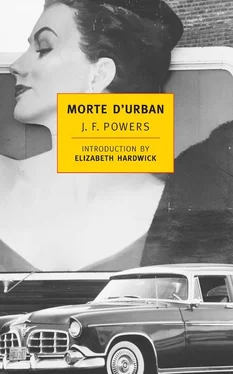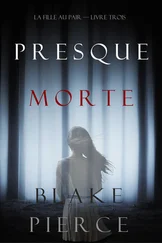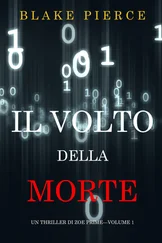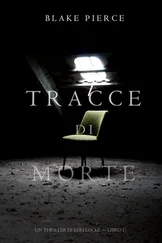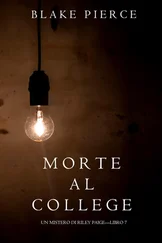“As a matter of fact, I’m leaving tomorrow.”
Early the next morning, Father Urban wrote a brief note—“My thanks for your hospitality, Yours in Christ, Fr Urban”—and stuck it under the old lady’s door. Then, carrying his attaché case and bag, he went downstairs to the car. Parked alongside it was the Hopwoods’ car, a new Ford convertible, a white one. Presently, Katie, who was usually there first in the morning, came out of the house and told him that Mrs Thwaites had lost the key to the car.
“I see,” he said. He saw, too, that Katie had been crying. “Well, in that case, maybe I’d better call a cab.”
One afternoon about a month later, late in September, Father Urban was summoned to the office. “Long distance for you,” said Wilf, and gave up his swivel chair.
“Hello,” said Father Urban. “ Hello! ” It was Billy, calling from Chicago. According to Billy, he had been sitting there in his office, not feeling so hot, when a little voice had said to him, “Hey, let’s go fishing.” The little voice hadn’t succeeded with Billy, though, until it said, “Hey, take Father Urban along.” That had done it. Billy was hoping to get in about three days — no more, unless they just couldn’t pull themselves away — at a place he liked about a hundred and fifty miles northeast of Duesterhaus, near the Canadian border. “How’re you fixed for time, Father?”
“Gee!” said Father Urban. “I’m afraid this is something for Father Wilfrid. I’ll see what he says. Fortunately, he’s right here.” Father Urban explained to Wilf what Billy wanted, making use of Billy’s words. Wilf, he knew, would make no objection, but would appreciate being consulted. “Here, Father. Why don’t you say hello?”
Wilf took over then. “What’s this about a little voice? Yes, this is Father Wilfrid. What’s this about a little voice?” Wilf said, getting quite a bang out of himself. Soon he was giving a glowing account of his stewardship at the Hill. He never did say whether it would be all right for Father Urban to go fishing. He was all for it, of course.
The plan was for Father Urban to meet Billy and Paul the next day at the station (they’d be arriving on the Voyageur), and for the three of them to have lunch at the Hill, perhaps play a round of golf, and then drive north. Father Urban was to provide the car.
This was a problem. Father Urban called several laymen, but for one reason or another they all failed him. By bedtime that night, he was down to three possibilities, none of which appealed to him. There was Monsignor Renton, but would he care to lend his black Imperial for a fishing trip? There was a used-car man in Great Plains who had somehow learned of Father Urban’s need and was offering to rent, sell, or trade a station wagon that couldn’t be trusted if what the man said was true: “Just the thing for a fishing trip, Father.” And there were the regular car-rental agencies in Great Plains and Olympe — they wanted a bit more than Father Urban was prepared to pay, in view of the other possibilities.
There was also Sylvia — the Beans had two cars besides the little Barracuda — but Father Urban hadn’t seen her lately. No trouble, no. Sylvia had taken him out to see Ray’s farm, where, among other things, Ray raised Morgan horses, and where, when Sylvia and Father Urban arrived that day, two hired men were about to breed a mare. Dear God! Father Urban’s first concern was for Sylvia’s sensibilities. But, much to his surprise, Sylvia got right into the act, so to speak. The last Father Urban heard (for he went off to have a look at the ducks) Sylvia was crying encouragement to the stallion and being cross with the mare. Ray, whom Father Urban had been expecting, and then hoping, to see drive up at any moment, hadn’t appeared at all. Since that day — and this happened shortly after the trouble at Lake Lucille — Father Urban hadn’t asked for the little Barracuda, nor had he seen Sylvia, or Ray.
Wilf, in all seriousness, offered Father Urban the pickup truck for the trip north. Father Urban, knowing Wilf’s admiration for the vehicle, said solemnly, “I wouldn’t want to leave you without transportation.”
The next day, as it turned out, Father Urban had to meet Billy (and Paul) in the pickup truck. He had the promise of Monsignor Renton’s Imperial, but he had to drive to Great Plains to get it — and the pickup truck simply refused to start until it was too late for him to do anything but go to the station. “A comedy of errors!” he cried before Billy (or Paul) could hear him, and ran up to shake Billy’s hand. A smile did for Paul. Billy was wearing a tan suit of whatever cloth it was the Army used in warm weather, a primrose shirt, with dotted navy-blue tie, and a dark straw hat with a dark-red band. Paul was wearing the pants to his off-black whipcord chauffeur’s suit and a conservative sports shirt. He had on a silly straw cap that Father Urban disliked intensely.
“I don’t see no Indians,” Paul said.
“Spoken like a true Chicagoan,” Father Urban said, and began again. “A comedy of errors! I had hoped to meet you in another car.” He looked over at the pickup truck with which Billy and Paul hadn’t yet associated him and told them of his trouble with it.
Billy and Paul stared at the thing. With its motor running — Father Urban had been afraid to turn it off — it seemed to tremble under their gaze.
“What happened to the old job you had when I was here last spring?” Billy asked, meaning Phil’s Plymouth.
“I’m afraid that one didn’t belong to us.”
“So what do we do?”
Father Urban said that they’d have lunch, which was doubtless being prepared at that very moment, and then he and Brother Harold would drive to Great Plains, and he, Father Urban, would come back in Monsignor Renton’s car.
“Good God,” Billy said.
“I’m afraid it means a delay of an hour or so.”
“I don’t like it,” Billy said.
“Why not play a little golf? I’ll catch you on four or five.”
“Not in the mood for golf.”
It seemed to Father Urban that Billy was blaming him for a situation he had done his best to prevent, but he said nothing. If you failed, as he had, it was better not to seek credit for trying, and Billy rather liked picking up the pieces anyway. Otherwise, he wouldn’t have had anything to do with the Clementines.
“I don’t like the idea of a borrowed car,” Billy said. “Let’s see if we can buy one.”
They left Paul with the luggage and walked over to the main street. Father Urban had been impressed by Billy’s casual approach to buying a car, but he was afraid that Billy wouldn’t be able to bring it off in Duesterhaus, where the dealers sold more farm machinery than cars. The first place looked unpromising, but the other had a station wagon in the window, a Rambler, a brown one — what Father Urban believed was called desert tan.
“That’ll do,” Billy said.
“I understand the resale value is high.”
“Can’t you use it around the place?”
Until then, Father Urban hadn’t been sure that the transportation problem at St Clement’s Hill was being solved. “God writes straight with crooked lines,” he said.
“Come again.”
Father Urban said that they’d had a certain amount of trouble with the pickup truck, and that he had often regretted (and never so much as that morning) having to meet visitors at the station in the old thing.
“What you said before — how’s that go again?”
Father Urban repeated the line. “It’s an old saying. From the Portuguese, I believe. Anyway, one of my favorites.”
“I like it,” Billy said, and they entered the establishment. “I’ll take the one in the window,” he told the man inside.
Читать дальше
